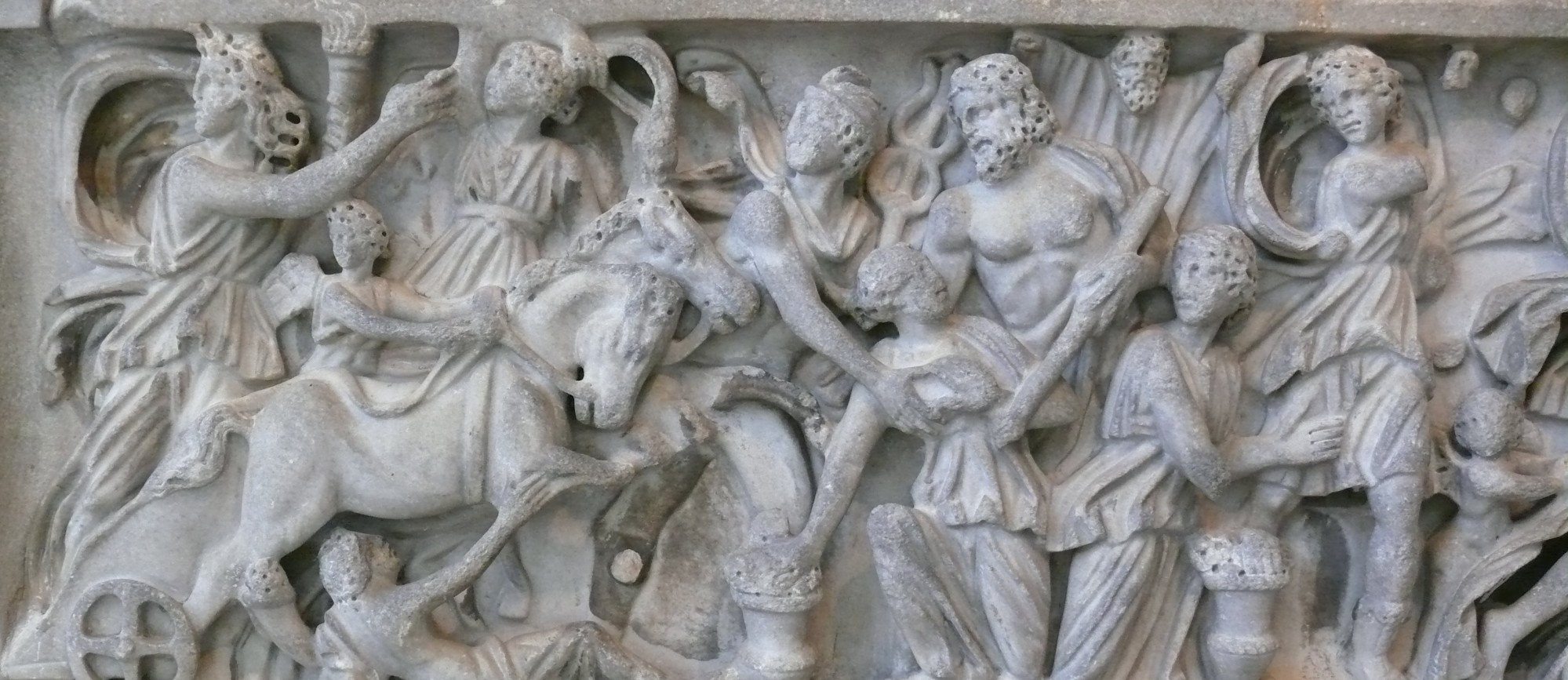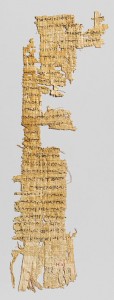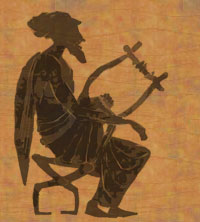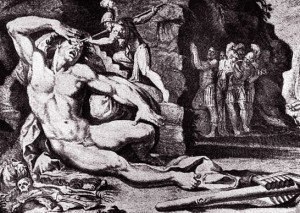The Odyssey, the epic poem created by Homer. Arguably one of the pinnacles of Greek myth. Also arguably one of the most tedious reading assignments in high school. The epic tale of our hero Odysseus and the trials he faced on his return home after the Trojan War. While the version of the Odyssey we know today was written down by Homer sometime in the 7th or 8th century, historians believe that the stories of the Odyssey began being told orally long before writing down of such stories took place. The Odyssey has its roots in the tradition of oral storytelling, leading us today to believe there are countless versions of the Odyssey that didn’t get written down, leaving them lost forever in history. The concept of what these lost stories could have held comes alive in the book The Lost Books of the Odyssey by Zachary Mason.
Mason calls upon images and stories we all recognize from the Odyssey, the cyclops, the sirens, Odysseus’s slaying of the suitors and faithful Penelope, and warps them. Playing with our expectations of these stories, Mason creates amazing new worlds with the tiniest twist in the common plots we know, even creating completely new stories to entice readers to imagine, what if? Christopher Logue also “reinterprets” ancient myths, his one work Patrocleia is particularly interesting, and you can check out a comparision of it to the original here.
Mason sets up the books as if he has translated lost fragments, re-discovered pieces of other version of the Odyssey. They range from completley new tales to the stories we aready know from the perspectives of other characters. There are 44 of these “fragments” but I will be focusing on 2 of these fragments and how they compare to the story we know.
Fragment 18, titled The Illiad of Odysseus, starts off with Odysseus’s point of view, a view we are unable to achieve in the Odyssey. We begin with Odysseus recounting his childhood training briefly, revealing that he was not one born for battle, nor did he want to partake in it. With his real desire to be a Bard, his father condemned this dream and told him he was a man born to live the stories, not sing them. Continuing on he recounts of when Agamemnon came to recruit him for the war, and the fear Odysseus felt. He fakes illness and his superiors interpret his false seizure as a sign that he is a favorite of a god, which Odysseus goes along with, saying Athena talks to him on occasion. Arriving at Troy he hated the war and the barbaric way the soldiers acted, but he stays because leaving would mean being disowned by his father, losing his rite to rule his land. After talking of his thoughts on battle and of Achilles, the story finally has a definitive difference in the plot from the Odyssey. I say definitive because until this point who is to say none of this is true?
Odysseus is known for his cunning wit, along with his ability to concoct stories and plans within seconds. The Odyssey is Odysseus telling every one of his heroics and thoughts. As mentioned before, Odysseus would not leave the war because he had too much pride. He would have rather “died than come down in the world”. Odysseus’s pride is the center of many choices he makes throughout the Odyssey, to say that it would also be the reason he would lie and pretend that he’s a great, head-strong warrior isn’t a far leap.
Going back to the story, in the fragment Odysseus sneaks into Troy, but this time not to talk to Helen, but to bribe one of her maids to kill her and bring him back her scalp, in hopes that the death of Helen would persuade Menelaus and Agamemnon to end the war. The Greeks begin to feud against each other, one half wanting to go home and the other wanting to stay and finish the war. During this argument the Trojans launch a full-out attack, in this moment of oppertunity Odysseus runs away from the battle, gathers a disguise and slips away. After slipping away Odysseus becomes a Bard, what he’s always wanted to do with his life, and starts spinning tales of his own bravery and cunning in the war, making himself into an ageless hero. After ten years Odysseus decides to return home, creating the tales of what had happened to him that prevented him from returning for 10 years.
This new perspective of taking the journey along with Odysseus opens up a new world of interpretations of his character. When reading the Odyssey what do you really know about Odysseus and his adventures that you don’t hear from him? Or from Bards recounting stories from the war? Odysseus is known for his ability to lie and plan on the spot, so what could stop him from creating these stories? This idea completely destroys the figure of Odysseus that is created in the Odyssey. He goes from this brave warrior, whose misfortunes prevent him from returning home to his beloved wife and land. Instead we have a scared, common man whose only self-proclaimed abilities are his finesse with the bow and rhetorical skills. A man who decided to watch his allies die and escape the war, living in hiding and falsifying stories of himself until he decided he “was done”, and wanted to return home to live a simple, normal life. This telling makes him more of a prideful, common man than a brave hero, loved by gods.
In fragment 26, Blindness, Mason further pushes the true character of Odysseus. This story is told through the perspective of Polyphemus, as he recounts his encounter with Odysseus and how it affected him. Through the eyes of the Polyphemus, he comes home one day to find his home full of intruders, taking his things and eating his food. He attempts to scare them away, but being as he is unbearable strong he accidently kills one of the crew members. Ashamed of this mistake he listens to the captain, Odysseus, and takes the wine he offers him. The wine putting him to sleep, Polyphemus wakes up blinded, and in rage flails trying to strike at Odysseus and his crew. In his new blindness Polyphemus spent a lot of time thinking about “Nobody”, the name Odysseus gave, and creating stories about him and his crew. It ends with him telling the stories to the farmers who no longer fear him as he is blind, and he speaks tales of this traveler, finding misfortune after misfortune trying to get home.
This ending with Polyphemus as a storyteller telling the stories of the trials of this hero can be interpreted that the cyclops is Homer. From his small interaction he creates his character as a cowardly warrior who has a brilliant mind, and builds these trials he suffers through, but never dies since death would be too easy of an escape. This fragment is also another way to think about Odysseus and his story telling. Even if he had faced trials on his way home, how accurate were his stories? As the only survivor Odysseus could say whatever he wanted. Why would anyone tell the story about how they invaded a peaceful creature’s home, stole their food, and blinded them when they could say they sleighed the mighty beast that attacked and killed his men? Another article that you can read here also plays with the idea that Odysseus is not such a cunning hero and is self-absorbed and reliant on the gods.
Both of these re-written pieces of the Odyssey open up interpretation to the whole book. Was Odysseus a brave hero in the Trojan War who fought for 10 years after to return home to his wife and son? Or was he just some scared man who lied so much throughout the years that the stories of his “heroics” caught on.





Exclusive Song: Aron Afshar | Darde Shirin With Text And Direct Links In UpMusics
MusicFA
The Odyssey, the epic poem created by Homer. thank you for sharing
The Odyssey, the epic poem created by Homer.
Informing. I enjoyed this so much. Will you be writing more soon?
Great post. Sometimes I wonder this too.
Growces Digital Marketing Agency’s professional team of digital marketers enables you to design your professional or personal brand and develop it on the internet through efficient digital marketing practices.
After reading these posts while I was really busy, I felt like it was a big break because I was lost in contemplation메이저사이트
keyifli bir mario deneyimi icin bizi takip edin.
This is such a nice article. Thank you so much for sharing your knowledge. Keep it up.
Your blog is very informative and I have learned many things from it. Thank you for writing this blog
Really Love This Blog post.. I am appreciate your work and this Blog article you post here.
Buy Furniture Online Stores
This is one of the most outstanding site I have found in quite a while thank you kindly, thank you for let me share this site to every one of my companions. Go ahead and visit my site
Excellent Article!!! I like the helpful information you provide in your article.
I read your Post and impressed your written skills you have such Great through.
Happy reading this article. One of the most important information for me.
Your website contains such useful information. Appreciate your written skills and your blog.
Its a great pleasure reading your post.Its full of information
The weather is getting cold now. I feel strange because it’s autumn, but your writing melts my heart
안전토토사이트 and I hope this good article will spread far away
Very interesting subject! Thank you for sharing. Now we have to share with you that you can have fun while winning prizes.
All you can do is play here in fachai9 philippines.
Basit ve şık tasarımı ile kolay kullanılabilir bir ara yüze sahip oynax oyun sitesinde binden fazla oyun yer almaktadır. Bir çok oyun kategorisinin yer aldığı sitede en çok tercih edilen kategoriler arasında futbol oyunları ve araba oyunları bulunduğu söylenebilir. Çok çeşitli oyunlar çevrimiçi fırsatlar sağlıyor. Böylelikle insanlar bu oyunlardan keyif alıyor. Kimi zaman hayatın akışı içerisinde bir macera, kimi zamanda spor etkinlikleri veya zeka gelişimini destekleyen alternatifler, burada karşınıza çıkabiliyor. Becerilerini kullanan ve bununla beraber kabiliyetini geliştirme şansı bulan insanların, oyun etkinliklerine yaklaşımı önemli olabiliyor. Bu yüzden hiç vakit kaybetmeden ilgili bağlantıyı takip ederek, binden fazla oyuna ücretsiz olarak erişebilirsiniz.
I have learned lot of things from it regarding blogging.thanks.باتری سمعک دوراسل 675
Cool post with lots of information.thanks.باتری سمعک دوراسل 10[Enter]
I would like say thanks for this post.باتری سمعک دوراسل 13
The information you convey very nice.thanks.باتری سمعک دوراسل 312
Keep posting like this informative articles.خرید واکسن hpv
thanks for information.باتری سمعک
This is really a wonderful website.thanksباتری سمعک ریواک[Enter]
Everything is well polished and perfectly written.باتری سمعک زیمنس
This is really a wonderful website.thanks for good information.باتری سمعک ریواک[Enter]
Everything is well polished and perfectly written.thank you.باتری سمعک زیمنس
massage is a great way to relieve muscle pain, soreness, and tension. It doesn’t matter whether this pain was caused by physical or mental stress, the massage will work it out for you.Visit massage in bangalore
Visit body massage near me Our centre has all the best equipment and highly trained staff, which makes it a complete solution to your body spa and massage needs. Visit our spa today if you’re looking for the best and most ideal spa in Bangalore.
Deep tissue massage is a type of massage therapy that uses firm pressure and slow strokes in order to reach deeper layers and fascia (the connective tissues surrounding the muscles). Deep tissue massage is used to treat chronic pains and areas like stiff neck and upper back, low back discomfort, tight leg muscles, sore shoulders, and other contracted conditions.Visit nuru massage near me
درمان بواسیر شفاکلینیک
https://shafa.clinic/treatment-of-hemorrhoids/
soo perfect
https://laser-doc.com/%d9%84%db%8c%d8%b2%d8%b1-%d8%b4%d9%82%d8%a7%d9%82/
good
https://shafa.clinic/laser-hemorrhoids/
me in your post is the way you use Mason’s novel to problematize the narrative that we have. You question the narrative of the Odyssey, and Mason offers different twists and theories that focus on different aspects of the story, prioritizing different values.
The ability of a modern work to use material from antiquity, but to adapt it to question modern values and beliefs, through the lens of the ancient, displays the mutability of myth, and helps explain how some stories have survived for so long, and continue to be relevant today. You argue that Mason questions the nature of
https://hormuztour.com/☕بهترین-کافه-های-جزیره-هرمز/
We need a professional web designer with experience (Check In InGeniousGuru), in order to jointly correct the usability of our website with a professional web development, and logo designing, mainly from USA.
I hope you lead on the right path. The Best Baccarat Strategies for Live and Online Casino
links from a page on one website to another. This is important to us and you are giving us a chance and opportunity to help each other. We are hoping to have the same goal for the future of ours. ole777 download
Great article. Thanks for sharing this blog.
Have a woderful day.مشاوره پوست
Congrats on an informative post my friend.نمونه دادخواست طلاق توافقی
It is the Powerball Association that accompanies the recommended site اعاده حیثیت
Hello, I am one of the most impressed people in your article.نفقه چیست
I’m absolutely enjoying your blog and look forward to new posts.پرستار در منزل
Great article. Thanks for sharing this blog.
Have a woderful day
عالی بود متشکرم
قیمت دستگاه جوش صبا 200 امپر توربو
Thanks
افزایش لایک
Thanks for your good articles. تولید لباس کار
download medical book
از اینجا دانلود کتاب ریاضی
بروید
پیشنهاد می کنم برای دانلود کتاب معماری
از سایت های عالی مثل داربوک استفاده کنید
یکی از مزایای اتاق فرار ، تقویت حواس مختلف افراد می باشد. شما باید از تمام پتانسیل های خود برای جستجو و یافتن سرنخ ها استفاده کنید.
Uniqop is a Persian online grocery store, Which is going to support you from A to Z in Persian cooking. From buying online groceries to finding the best recipes, you can count on Uniqop everywhere of the UnitedStates.
emc protection
پارس شیلد تولید کنده محصولات ضد امواج الکترومغناطیس پارس شیلد
emf paint protection
رنگ ضد امواج الکترومغناطیس پارس شیلد
emf protection
لباس بارداری ضد امواج الکترومغناطیس پارس شیلد
own of such stories took place. The Odyssey has its roots in the tradition of oral storytelling, leading us today to believe there are countless versions of the Odyssey that did
https://avije.org/مشاوره-کنکور-هنر-دانشگاه-سراسری/
This ending with Polyphemus as a storyteller telling the stories of the trials of this hero can be interpreted that the cyclops is Homer.
to adapt it to question modern values and beliefs, through the lens of the ancient, displays the mutability of myth
https://psychology.avije.org/مشاوره-کودک/تربیت/مشاوره-فرزند-و-مشکلات-مشاوره/
hamid az ghorveh
https://psychology.avije.org/عشق/و-هوس-را-چگونه-از-هم-تشخیص-دهیم/
hamed az tekab
i like your website – post more myth stuff!
thanks for this. good job
I really like the idea of Odysseus not being the archetypal hero, but instead using his cunning and wits to make himself appear to be a hero. It’s interesting to think about the concept of the hero and why it was so important to the ancient Greeks. Why did Odysseus have to act like a hero, even if all his actions were made up? Why couldn’t he just accept being a normal person? I talk about this idea more in my post and about what the concept of the hero means in today’s society.
http://pages.vassar.edu/grst-202-52-2015b/?p=105
I personally think this is really cool! I haven’t read any of the “lost books” of the Odyssey but they sound very interesting. I think it is an incredible point that the entire journey is recounted by Odysseus, who is know for his cunning and ability to lie/make up stories on the spot, so it wouldn’t surprise me at all that a lot of his journey was made up. The only thing that makes me hesitate, however, is the fact that he killed all 108 (I think) of Penelope’s suiters once he got home–he did have a little help, but still, that’s a lot of suitors. That leads me to believe that he did enjoy battle to some extent. But still, he could have been a well trained (but reluctant warrior who thought war to be awful) and was just trying to justify all his stories.
The idea that there were multiple versions of the Odyssey, and that Homer’s is the only one that survived is fascinating. I love Mason’s book – it’s an engrossing and thought provoking read. What interests me in your post is the way you use Mason’s novel to problematize the narrative that we have. You question the narrative of the Odyssey, and Mason offers different twists and theories that focus on different aspects of the story, prioritizing different values.
The ability of a modern work to use material from antiquity, but to adapt it to question modern values and beliefs, through the lens of the ancient, displays the mutability of myth, and helps explain how some stories have survived for so long, and continue to be relevant today. You argue that Mason questions the nature of a hero, and the reliability of narration. In my post, I also look at how a myth can be adapted to reflect changing values.
Link to my post:
http://pages.vassar.edu/grst-202-52-2015b/2015/05/01/christopher-logues-patrocleia/